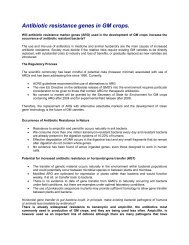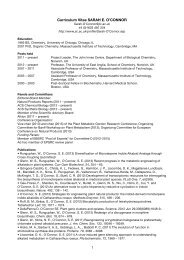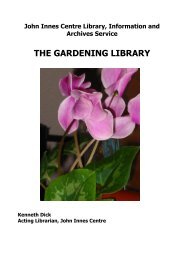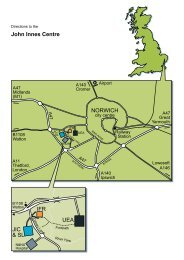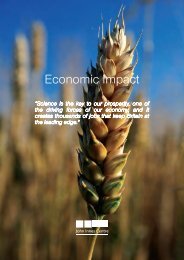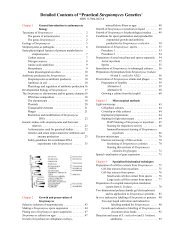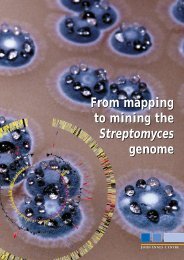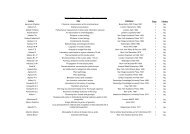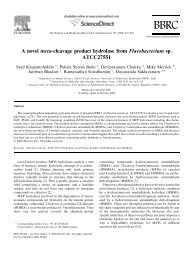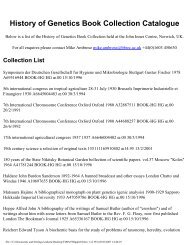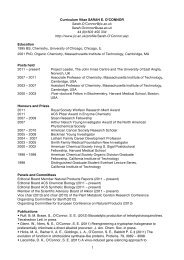here - John Innes Centre
here - John Innes Centre
here - John Innes Centre
Create successful ePaper yourself
Turn your PDF publications into a flip-book with our unique Google optimized e-Paper software.
JICISBEST MEST-CT-2004-504273<br />
Career Development Programme - Final Report<br />
4. Nicole Steinmetz developed a method for the assembly of multilayer arrays of viral nanoparticles via<br />
biospecific recognition: (Biomacromolecules, 2008 9, 456–462).<br />
5. Frank Sainsbury developed methods for expression of multiple proteins using full-length and deleted<br />
versions of cowpea mosaic virus RNA-2 (Plant Biotechnology Journal, 2008 6, 82-92).<br />
RESEARCH TRAINING ACTIVITIES<br />
FINAL REPORTS FROM EST FELLOWS<br />
From the final reports of EST Fellows, 8 rated the quality of research training received at JIC as “Excellent”;<br />
6 as “Very Good”; 1 as “satisfactory; and none as unsatisfactory.<br />
Some examples of comments from EST Fellows are set out below:-<br />
1. I really enjoyed my time at the <strong>John</strong> <strong>Innes</strong> <strong>Centre</strong>. It is a fantastic place to do research, with lots of<br />
additional training opportunities.<br />
2. The <strong>John</strong> <strong>Innes</strong> <strong>Centre</strong> provides a great place for interactions with scientists in other research areas.<br />
This became very useful for technical advice and sharing resources for my research work.<br />
3. During the training, I was planning and managing my own experiments. I have also successfully had<br />
experience in writing my own grant applications during my third year to secure independent funding<br />
after completion of my PhD.<br />
4. From daily lab work I learned basic laboratory skills, especially in molecular biology and plant<br />
biochemistry. I also learned advanced bioinformatics knowledge especially in protein modelling and<br />
attended an advanced course on epigenetics.<br />
5. Twice a year, I presented my results and future objectives to a lab meeting using powerpoint<br />
presentations. I also presented posters at national and international conferences.<br />
6. I have increased my management skills; I have demonstrated that I can plan my work and meet<br />
deadlines. I am currently writing proposals and fellowship applications.<br />
7. A 4-week research visit to a lab in Amsterdam allowed me to get interesting experience both on<br />
techniques and ideas from a very influential lab in my area of interest.<br />
8. Attending international conferences helped me to establish productive collaborations and put me in<br />
touch with scientists in my field from around the world.<br />
9. I have communicated with the press through articles about my work in local and national media.<br />
Furthermore, I have given talks at two British schools, explaining to school children what<br />
biotechnology is.<br />
10. Taking part in the Biotech YES scheme was a great chance to make use of the transferable skills that<br />
I had learned through the programme of professional skills training.<br />
11. JIC exposes the students to a huge range of research possibilities. Ambitions are always kept high so<br />
students know what they should be aiming for.<br />
12. The facilities at JIC are remarkable and I never suffered any delays due to a lack of resources.<br />
RESEARCH EXPERIENCE:<br />
For each EST Fellow, a supervised research project served as the vehicle for an intensive training in research<br />
techniques and gave practical experience of how to develop strategies for scientific analysis and how to<br />
design and execute experiments to pursue a meaningful line of enquiry. Fellows also attended and participate<br />
in a wide range of seminar programmes designed to improve their knowledge of the research field and<br />
develop their skills in science communication.<br />
Supervisory Committees and Personal Career Development Planning: Within the first two weeks of<br />
arrival, the Fellow’s supervisor established a Supervisory Committee (comprising the supervisor plus at least<br />
two other academic staff). This Committee met periodically to discuss the Fellow’s research objectives and<br />
individual training needs, both technical and generic. These meetings normally followed the submission of<br />
written or oral research progress reports by the Fellow.<br />
LECTURES AND SEMINARS<br />
Experience gained through the Fellows’ own research project was complemented by the development of a<br />
deeper understanding of contemporary developments in plant and microbial sciences. This was made<br />
4



